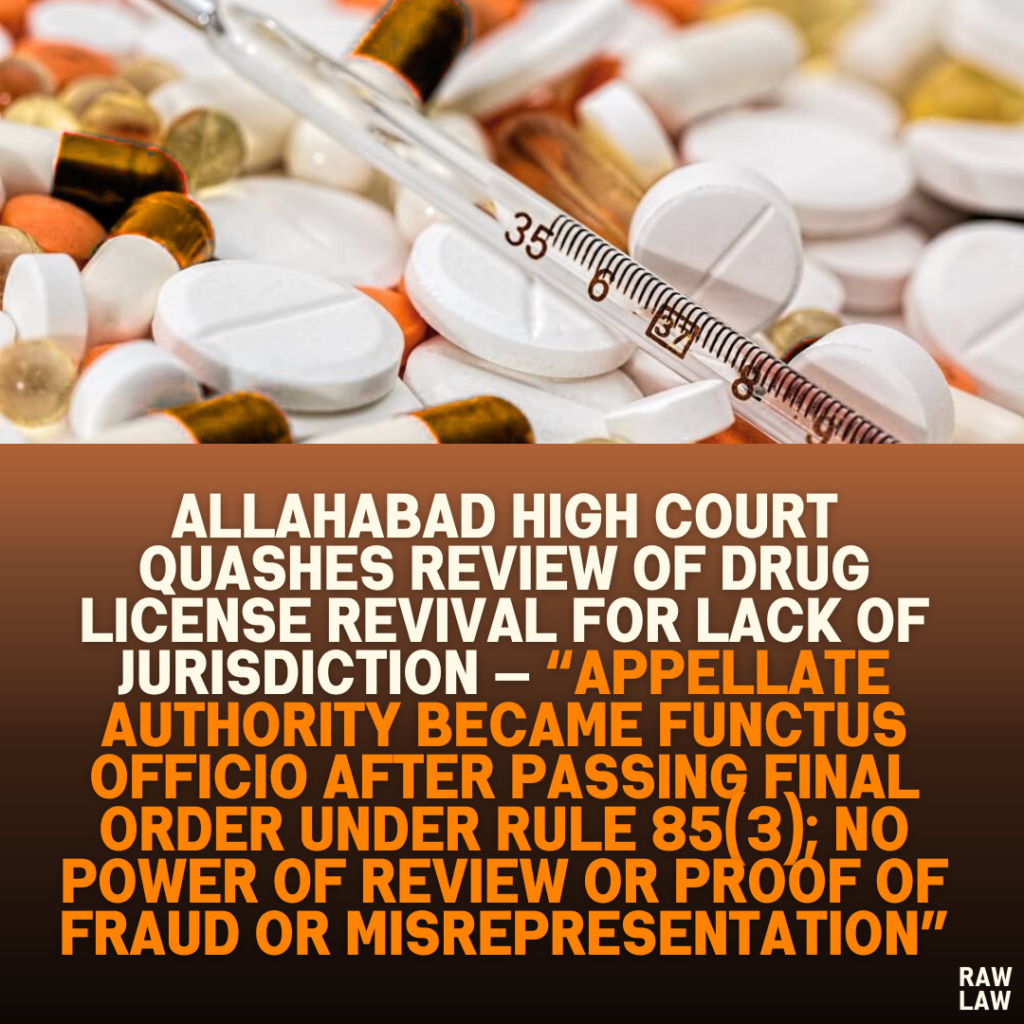Court’s Decision
The Allahabad High Court allowed the writ petition, setting aside the order dated 4.10.2023 passed by the Appellate Authority/Special Secretary, Food, Safety and Drug Administration, U.P., which had suspended its earlier order dated 11.8.2023. The Court held that:
“Appellate authority having passed the order dated 11.8.2023 became functus officio. The moment he passed the order… his appellate power under Rule 85(3) of Rules 1945 comes to an end.”
The Court concluded that the appellate authority lacked jurisdiction to review its earlier order in the absence of any express statutory provision, and no fraud, forgery, or misrepresentation was made out to justify invoking any inherent power.
Facts
The petitioner company, engaged in manufacturing pharmaceutical drugs, held valid licences in Form 25 and Form 28 under the Drugs and Cosmetics Rules, 1945, to manufacture drugs including DOK-1 Max syrup for export. Following the deaths of 15 children in Uzbekistan allegedly linked to the consumption of the said syrup, a joint inspection by Central and State Drug Authorities was conducted between December 2022 and January 2023.
Show cause notices were issued citing the detection of Diethylene Glycol (DEG) and Ethylene Glycol (EG) beyond permissible limits in the drug samples. Based on test reports and alleged licence violations, the petitioner’s licences were cancelled on 13.3.2023 by the State Licensing Authority without allowing the mandatory 28-day period for objection under Section 25(3) of the Drugs and Cosmetics Act, 1940.
The petitioner successfully challenged the cancellation before the Appellate Authority, which on 11.8.2023 revived the licences with restrictions on manufacturing drugs containing Propylene Glycol (PG). Subsequently, a review application was filed by the Assistant Commissioner (Drugs) on 4.10.2023, and on the same day, the appellate order was suspended.
Issues
- Whether the Appellate Authority under Rule 85(3) of the Drugs and Cosmetics Rules, 1945 has jurisdiction to review its own order in absence of a specific statutory provision?
- Whether the principle of “functus officio” applied to bar such review?
- Whether the review was justified on grounds of fraud, misrepresentation, or concealment of material facts by the petitioner?
Petitioner’s Arguments
- The appellate authority had become functus officio after passing the final order dated 11.8.2023, and had no statutory power to review its own decision.
- Review was granted ex parte without any notice or opportunity of hearing to the petitioner.
- No error apparent on the face of record, new material, or fraud existed to justify invoking any inherent power.
- Cited decisions:
- Naresh Kumar v. Govt. of NCT of Delhi (2019) 9 SCC 416
- Patel Narshi Thakershi v. Pradyuman Singhji (1973) 3 SCC 844
- Manas Medicos v. State of Punjab, 2010 SCC OnLine P&H 5184
Respondent’s Arguments
- The presence of toxic impurities in the drugs posed serious public health risks, justifying intervention.
- Alleged that petitioner misrepresented facts regarding judgments from Uzbekistan courts.
- Argued that in public interest, appellate authorities have inherent powers to review decisions to prevent miscarriage of justice.
- Invoked exception to functus officio doctrine in case of fraud or misrepresentation.
- Relied on judgments:
- Indian Bank v. Satyam Fibres (India) Pvt. Ltd., (1996) 5 SCC 550
- S.P. Chengalvaraya Naidu v. Jagannath, (1994) 1 SCC 1
- Budhia Swain v. Gopinath Deb, (1999) 4 SCC 396
- A.V. Papayya Sastry v. State of A.P., (2007) 4 SCC 221
Analysis of the Law
The Court clarified that:
- The doctrine of functus officio applies once an appellate authority has finally decided a matter.
- Review powers must be conferred expressly by statute or by necessary implication; they cannot be assumed.
- The Drugs and Cosmetics Act, 1940 and the Rules, 1945 do not provide any review power to the appellate authority.
- In absence of such provision, the appellate authority was barred from reviewing its own order.
The Court differentiated between a judicial/quasi-judicial act and administrative policy decisions, clarifying that functus officio applies more stringently to the former.
Precedent Analysis
The Court relied extensively on the following rulings:
- Orissa Administrative Tribunal Bar Assn. v. Union of India, 2023 SCC OnLine SC 309 — to explain functus officio.
- Patel Narshi Thakershi and Shivraji v. Dy. Director of Consolidation — no review without statutory backing.
- Indian Bank, Papayya Sastry, Budhia Swain — fraud may justify recalling a judgment, but only if conclusively proven.
Court’s Reasoning
The Court held that:
- No new facts or materials were presented in the review application that were not already considered during the appellate proceedings.
- The presence of DEG and EG, deficiencies in the factory, and deaths in Uzbekistan were known and considered during the appeal.
- The judgments of Uzbek courts were part of the earlier consideration. There was no prima facie evidence of fraud or misleading submissions.
- The review order of 4.10.2023 was passed on the same day the application was filed, without hearing the petitioner, rendering it procedurally flawed.
“The review order… is nothing but a personal whim of the authority concerned, who wants to review the order dated 11.8.2023… I did not find any such ingredient which comes within the definition of fraud/forgery or misrepresentation.”
Conclusion
The appellate authority under Rule 85(3) had no jurisdiction to review its own order dated 11.8.2023. The review order dated 4.10.2023 was passed without authority, without hearing, and without new material or fraud, and hence was quashed. The High Court restored the appellate order dated 11.8.2023.
Implications
This judgment underscores that:
- Appellate authorities under special statutes like the Drugs and Cosmetics Act are strictly limited to powers expressly conferred.
- Finality of decisions under the doctrine of functus officio is critical in quasi-judicial proceedings.
- Allegations of fraud cannot be used as a pretext for administrative overreach unless clearly and conclusively established.
- Procedural safeguards like natural justice and fair hearing are essential even in regulatory regimes.
